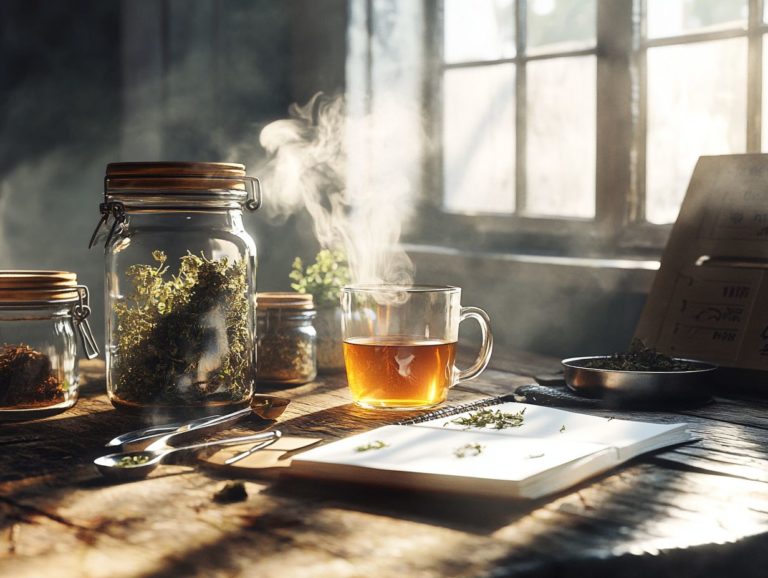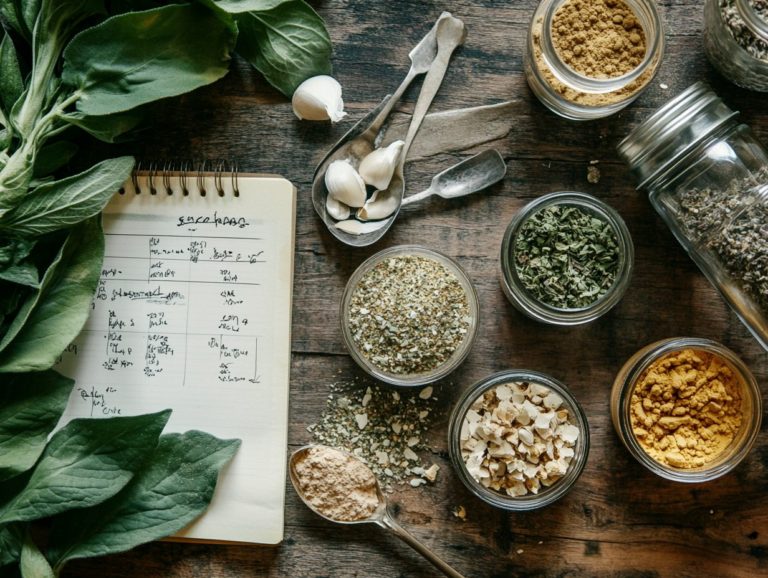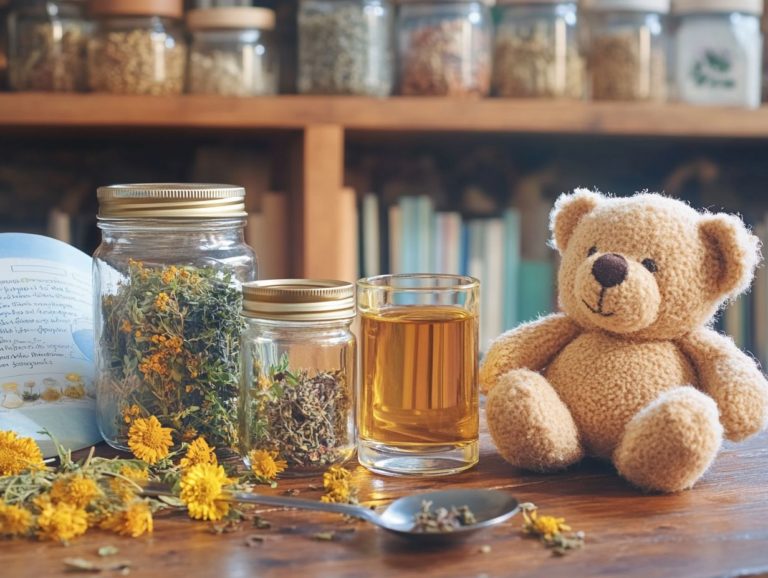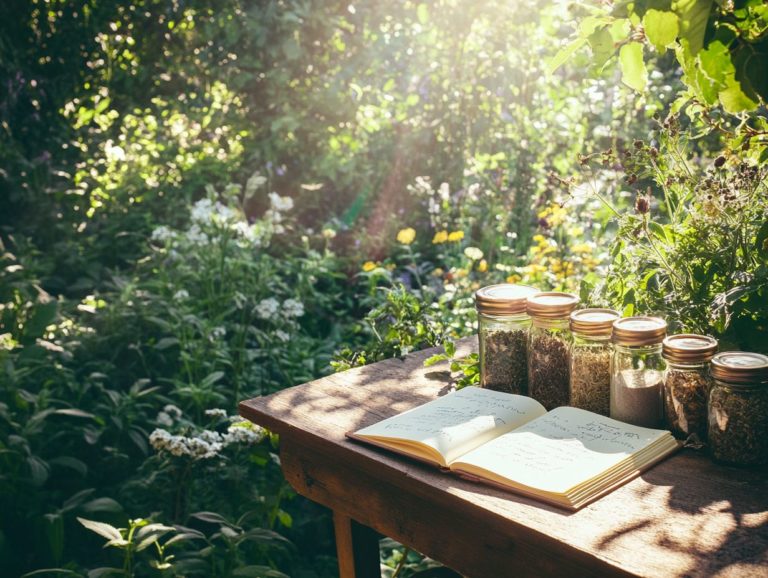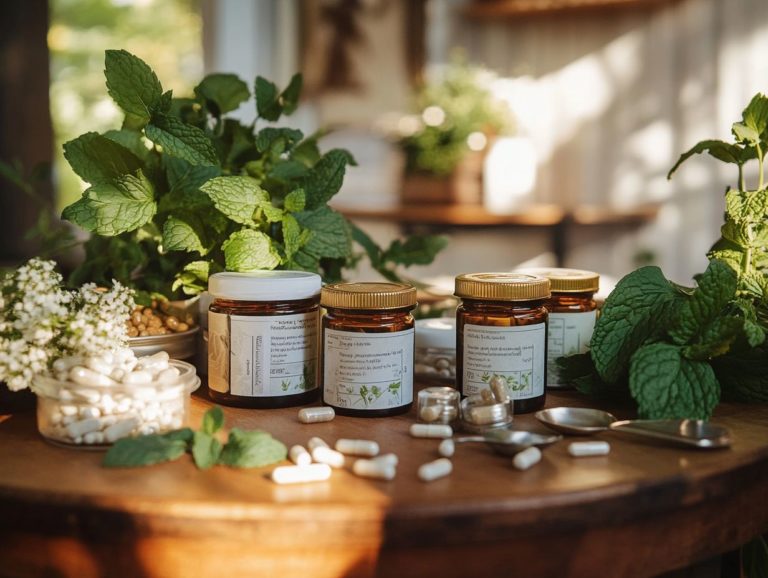The Impact of Herbal Quality on Dosage Safety
Herbal remedies have become increasingly popular as natural alternatives for various health concerns. However, not all herbs are created equal.
Understanding the factors that influence herbal quality is vital for ensuring effectiveness and safety in your health journey. This article explores how the quality of herbs affects dosage safety, the potential risks of using subpar products, and provides practical guidelines for selecting and preparing herbs with care.
You ll also discover alternatives to herbal dosages, empowering you to make informed choices that align with your health goals.
Contents
- Key Takeaways:
- Understanding Herbal Quality
- Importance of Quality in Dosage Safety
- Potential Risks of Poor Quality Herbs
- Ensuring Quality in Herbal Dosages
- Alternatives to Herbal Dosages
- Frequently Asked Questions
- What is the impact of herbal quality on dosage safety and the safety assessment of herbal remedies?
- How can herbal quality impact the safety of dosage?
- What are some red flags to look out for in herbal quality?
- Can herbal quality influence the recommended dosage for a product?
- Is herbal quality regulated by any governing body?
- How can I ensure the herbal products I use are of high quality?
Key Takeaways:
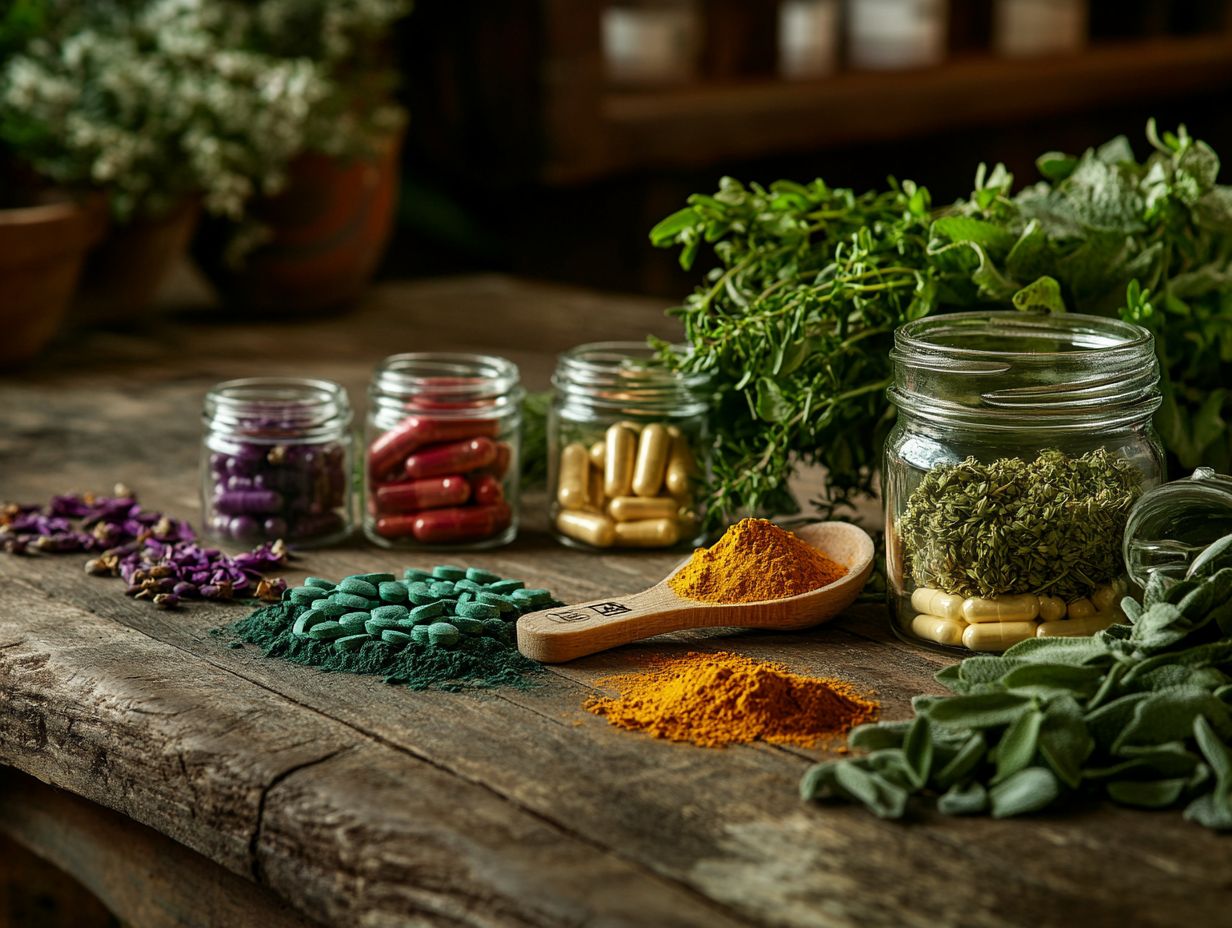
- Poor herbal quality can lead to serious consequences on dosage safety, potentially causing adverse health effects.
- Factors such as sourcing, preparation, and storage greatly impact the quality of herbs and their safety for consumption.
- Carefully researching and selecting high-quality herbs, along with following proper preparation guidelines, is crucial for ensuring safety and effectiveness in herbal dosages.
Understanding Herbal Quality
Understanding herbal quality is essential for ensuring that herbal medicine provides its intended health benefits safely and effectively. Key factors include the sourcing of medicinal plants, the identification of active ingredients, and rigorous quality assurance and control.
The quality of these herbs directly influences their medicinal properties, affecting both therapeutic efficacy and safety evaluations. As consumer awareness rises, adhering to regulatory measures and standards set by esteemed organizations like the World Health Organization and the Therapeutic Goods Administration becomes increasingly essential. Additionally, for older adults, following herbal remedies dosage tips can further enhance safety and effectiveness.
Factors that Affect Quality
Several factors influence the quality of herbal medicine. These include how you cultivate medicinal plants, the climate they thrive in, the quality of the soil, and the methods used to extract active ingredients.
The environment where your plants grow plays a crucial role. Variations in temperature, humidity, and sunlight can all impact the concentration of beneficial compounds. The cultivation methods you choose, such as organic practices or conventional farming, can also dictate the presence of harmful pesticides or fertilizers.
The extraction techniques employed, from steam distillation to solvent extraction, further determine the potency and efficacy of your final herbal supplement. Standardization processes are crucial to ensure consistency and reliability in product formulation, ultimately safeguarding consumer health.
Importance of Quality in Dosage Safety
Quality is everything when it comes to ensuring the safety of your herbal doses! The efficacy and safety of herbal therapy hinge directly on the quality of the preparations you choose.
Choosing well-sourced, carefully prepared herbal products maximizes benefits and minimizes risks. Without rigorous quality control and efficacy evaluations, you might jeopardize your health by using inferior or contaminated herbal supplements.
Don’t compromise your health; always prioritize quality to enjoy the full benefits of herbal therapy. For more insights, check out herbal safety: what you need to know.
How Herbal Quality Affects Dosage Safety
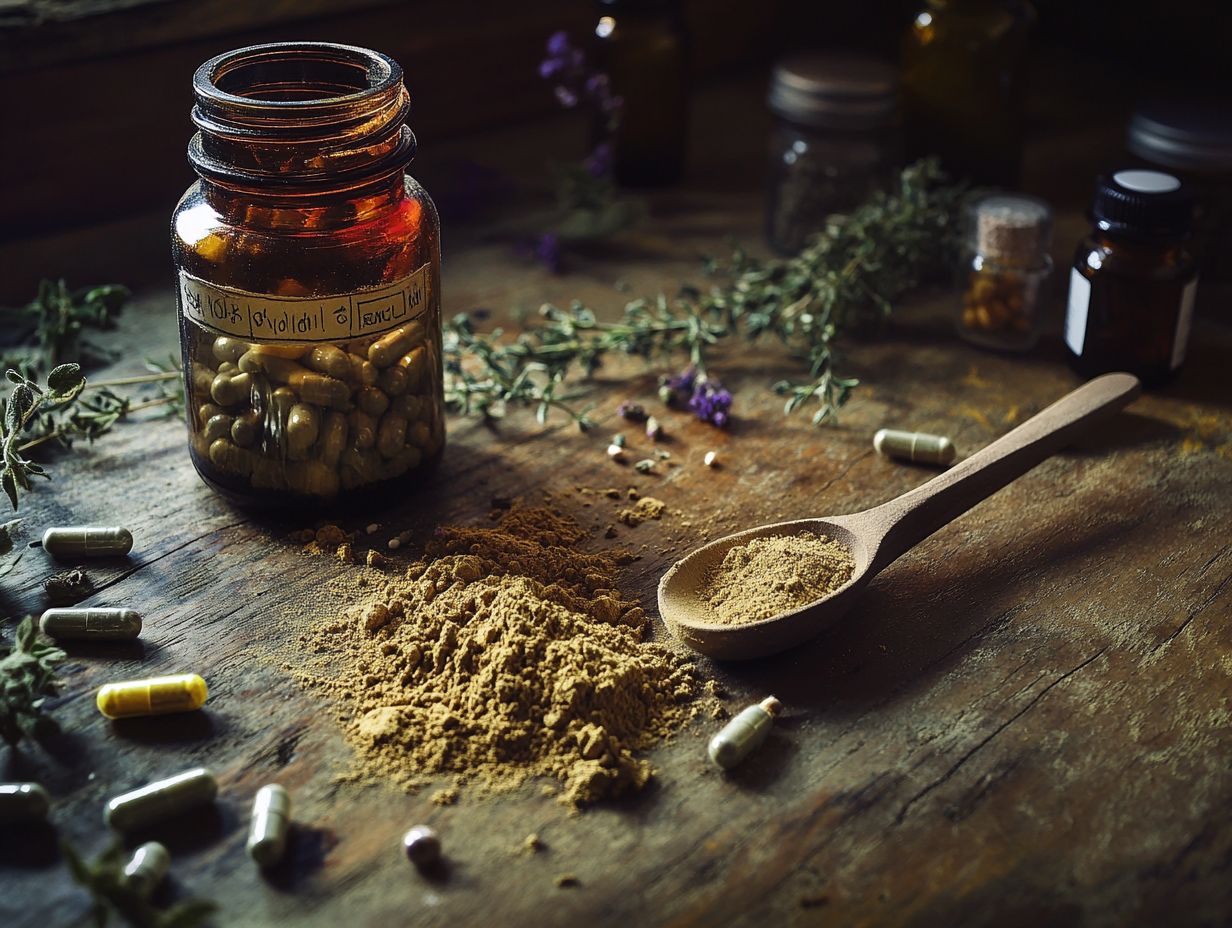
Herbal quality plays a pivotal role in dosage safety. Fluctuations in the concentration of active ingredients and the potential presence of harmful contaminants can pose serious health risks.
When selecting herbal products, it’s easy to assume these remedies are inherently safe. However, the reality is that poor quality control can distort safety assessments and risk evaluations. Herbal preparations crafted from subpar plants may fail to deliver the benefits they promise, while also introducing adverse effects stemming from toxic substances or miscalculated dosages. To ensure safe usage, it’s crucial to refer to understanding herbal dosage, which provides comprehensive guidance on the proper use of these remedies.
Inadequate testing can cause unpredictable interactions with other medications or even worsen existing health conditions. This underscores the necessity for strict standards and reliable sourcing. Guaranteeing the quality of herbal products is essential for consumer safety, making it vital to understand the importance of safety in herbal medicine.
Potential Risks of Poor Quality Herbs
Using low-quality herbs in herbal therapy carries potential risks that could lead to significant health concerns. You might encounter unexpected side effects and adverse reactions that could compromise your well-being.
Contaminated or improperly prepared herbal products can introduce toxins, allergens, or harmful substances. These may interact negatively with your prescribed medications, raising the chances of serious health issues. To avoid potential pitfalls, be aware of 5 common herbal dosage mistakes and conduct safety checks for toxins; it’s vital to ensure you get effective treatments.
Health Consequences and Side Effects
Don’t risk your health! Low-quality herbal remedies can lead to severe side effects, ranging from mild gastrointestinal discomfort to potentially life-threatening allergic reactions.
In many instances, these inferior products might be tainted with harmful substances or fail to deliver the advertised levels of active ingredients. This can result in ineffective treatment or unexpected toxicity. You may have encountered stories where commonly used herbs like Echinacea or St. John s Wort sourced from questionable suppliers led to issues ranging from skin rashes to dangerous interactions with prescription medications.
For example, there’s a documented case where an individual’s use of a poorly manufactured herbal supplement culminated in acute liver failure due to undisclosed ingredients. Such alarming incidents highlight the critical need for you to carefully scrutinize the quality and source of herbal products. Understanding the role of body weight in herbal dosage is essential in mitigating these serious health risks.
Ensuring Quality in Herbal Dosages
Ensuring quality in herbal dosages is essential for maximizing therapeutic benefits while minimizing health risks. This involves adhering to established guidelines and regulatory measures set forth by authorities and herbalist associations.
By doing so, you not only enhance the efficacy of the herbs but also safeguard your well-being.
Guidelines for Selecting and Preparing Herbs

Guidelines for selecting and preparing herbs effectively enable you, as a herbal therapy practitioner, to ensure the use of high-quality herbal preparations that are both safe and efficacious.
Start by sourcing herbs from reputable suppliers who prioritize sustainable practices and organic cultivation. It’s essential to be diligent in assessing the quality of the herbs you choose. For safe usage, consider checking herbal supplements: understanding recommended dosages and take note of factors such as color, aroma, and moisture content to determine their freshness.
Once you’ve secured your herbs, the preparation methods you select—whether drying, infusing, or creating tinctures—can significantly influence the potency of your herbal remedies. It’s also important to know when to adjust your herbal dosage. Implementing quality control measures like batch testing and ensuring proper storage conditions will help maintain the integrity and effectiveness of your preparations.
By adhering to these best practices, you can maximize the therapeutic benefits of your products. This includes knowing how to measure herbal dosages accurately, which ultimately enhances the overall outcomes for your clients. Always choose high-quality herbs for your health and safety!
Alternatives to Herbal Dosages
Exploring alternatives to herbal dosages is vital for addressing your health concerns. By considering a wider array of natural remedies and plant-based treatments, you can enhance your approach to wellness and effectively complement traditional medicine.
Other Natural Remedies for Health Concerns
Other natural remedies for your health concerns extend beyond just herbal therapy. They encompass a variety of additional treatments that tap into the healing properties of various natural substances.
These remedies include homeopathy, essential oils, and nutritional supplements. Each offers distinct benefits for different health issues. For example, you can utilize essential oils for aromatherapy, which may help relieve stress and anxiety. Meanwhile, nutritional supplements can bolster your overall wellness by addressing specific deficiencies.
Understanding how these remedies interact is essential. Certain combinations can enhance their effectiveness or lead to unexpected side effects. By exploring these diverse options, you can craft a complete health plan that truly aligns with your personal needs.
Frequently Asked Questions
What is the impact of herbal quality on dosage safety and the safety assessment of herbal remedies?
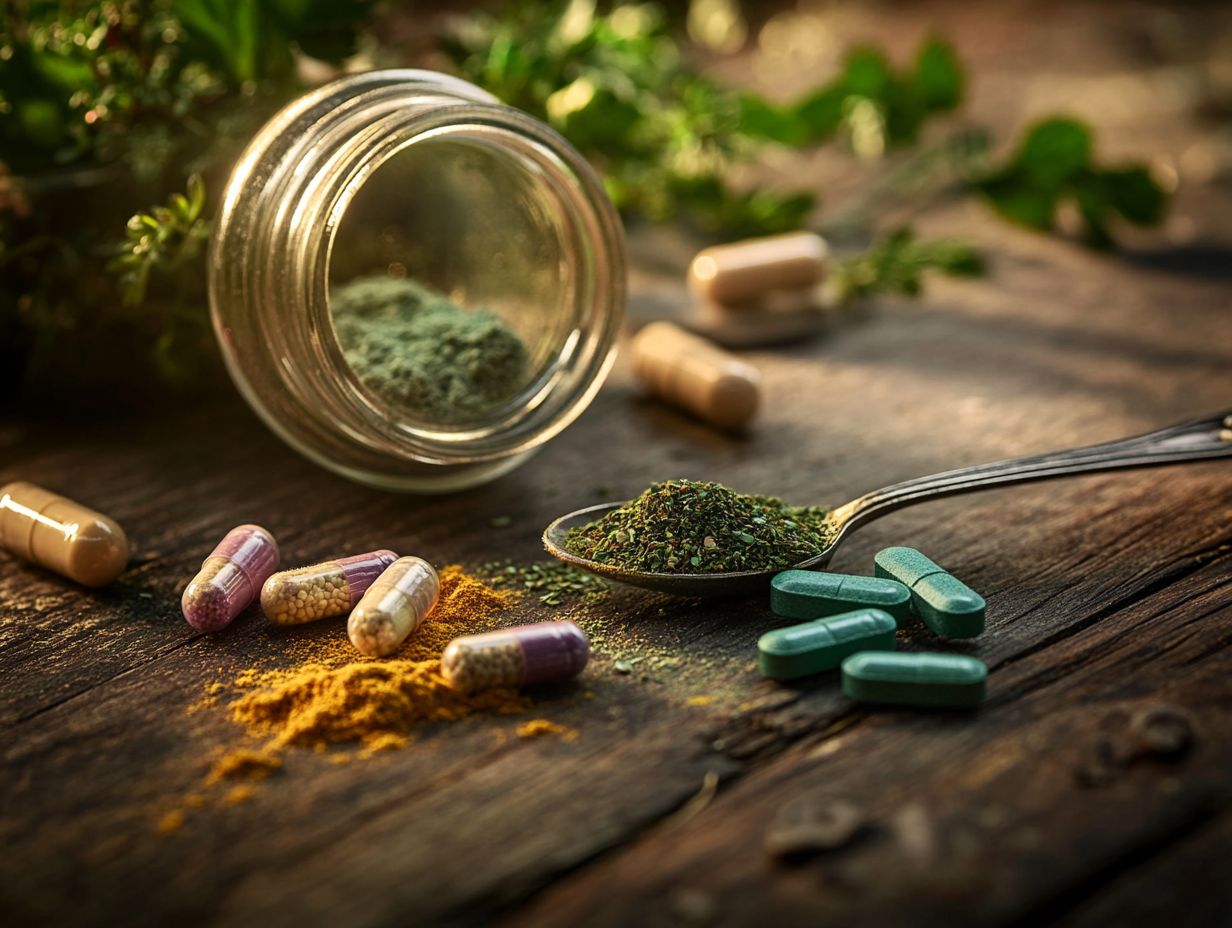
The quality of herbal products can greatly affect their safety and effectiveness when taken in recommended dosages. For those interested in making their own remedies, following creating herbal remedies safety tips is crucial. Poor quality herbs may contain harmful substances or inconsistent levels of active ingredients, which can lead to adverse effects or inadequate treatment, raising health concerns for consumers.
How can herbal quality impact the safety of dosage?
Herbal quality can impact dosage safety in various ways. Factors like potency, purity of active ingredients, the presence of contaminants, and proper identification of the herbal material can significantly affect the intended effects and potential side effects of the herbal product, as well as its interactions with pharmaceutical medications.
What are some red flags to look out for in herbal quality?
Suspiciously low prices, lack of proper labeling and instructions, and claims of a “secret” or “magical” ingredient are all potential red flags for poor herbal quality. Always buy herbal products from trusted sources to ensure your health and safety!
Can herbal quality influence the recommended dosage for a product?
Yes, herbal quality can play a role in determining the appropriate dosage for a product. For example, a higher quality herbal product may require a lower dosage to achieve the desired effect, while a lower quality product may need a higher dosage for the same effect. It’s important to follow the recommended dosage guidelines for the specific herbal product you are using.
Is herbal quality regulated by any governing body?
In the United States, herbal products fall under the regulation of the Food and Drug Administration (FDA). However, herbal supplements are not held to the same standards as prescription drugs, and quality control can vary between manufacturers. It’s crucial to research the reputation and quality control practices of the company producing the herbal product.
How can I ensure the herbal products I use are of high quality?
To ensure the quality of herbal products, purchase from reputable sources, research the specific product and its ingredients, and look for third-party certifications or quality seals. Consulting with a healthcare professional before starting any new herbal supplements is also helpful.

